unit 9 Section A Grammar-3c课件(共23张PPT)人教版八年级上册
文档属性
| 名称 | unit 9 Section A Grammar-3c课件(共23张PPT)人教版八年级上册 | 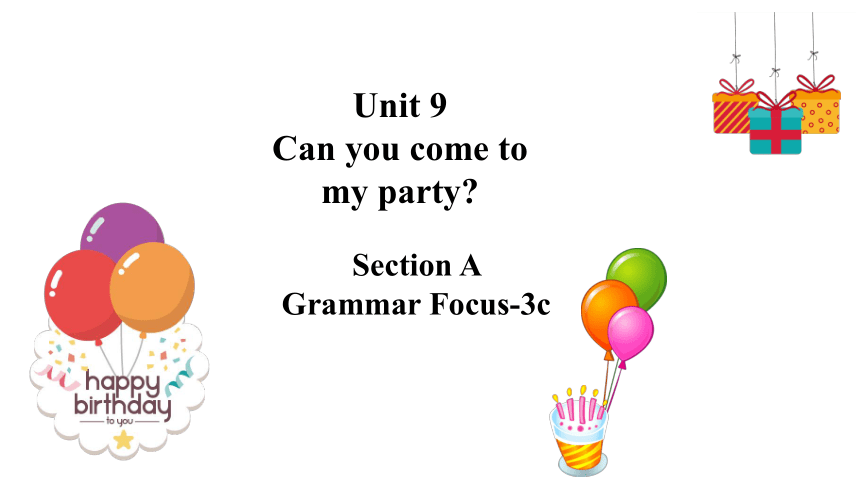 | |
| 格式 | pptx | ||
| 文件大小 | 3.1MB | ||
| 资源类型 | 教案 | ||
| 版本资源 | 人教新目标(Go for it)版 | ||
| 科目 | 英语 | ||
| 更新时间 | 2023-12-18 10:17:58 | ||
图片预览

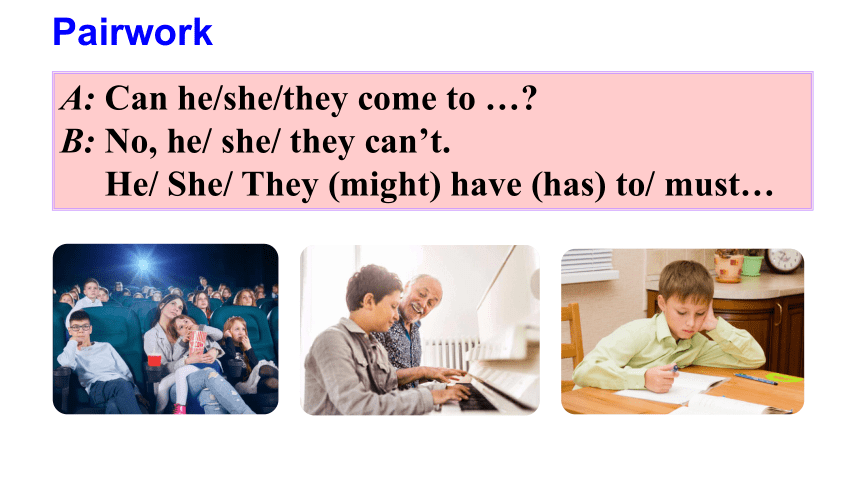
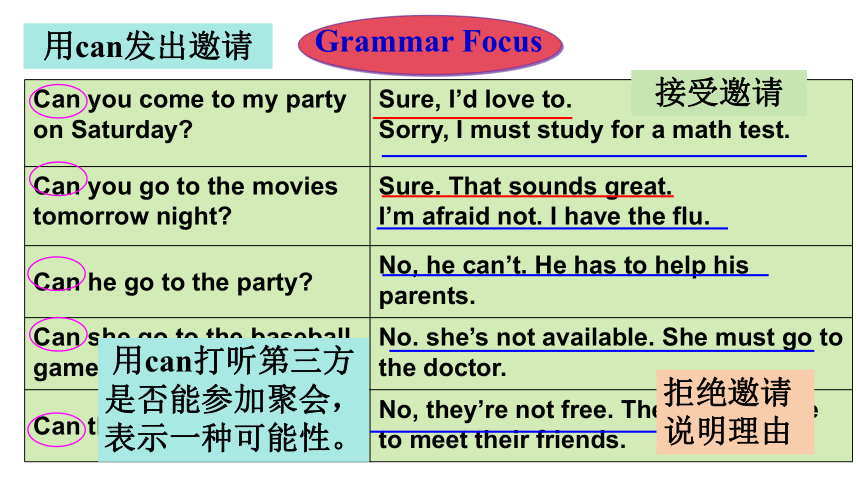
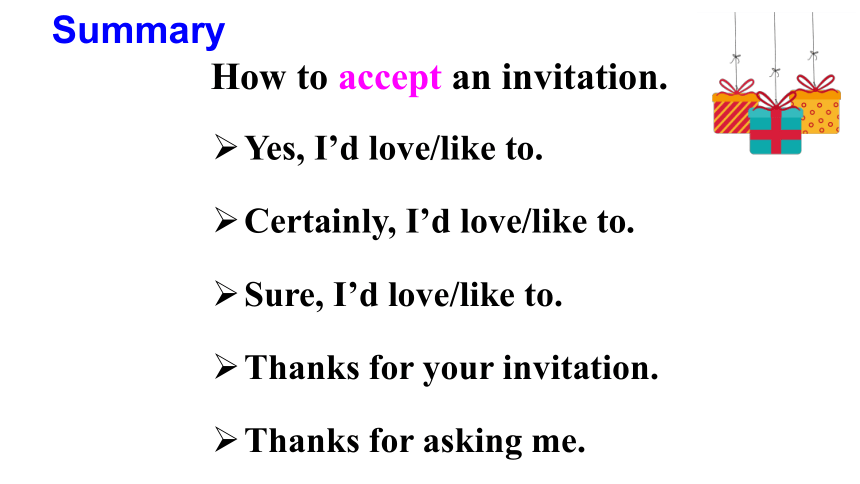
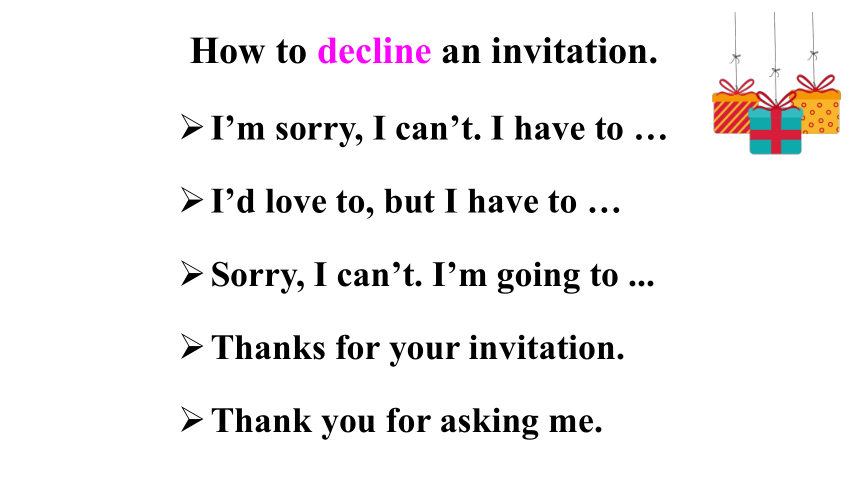
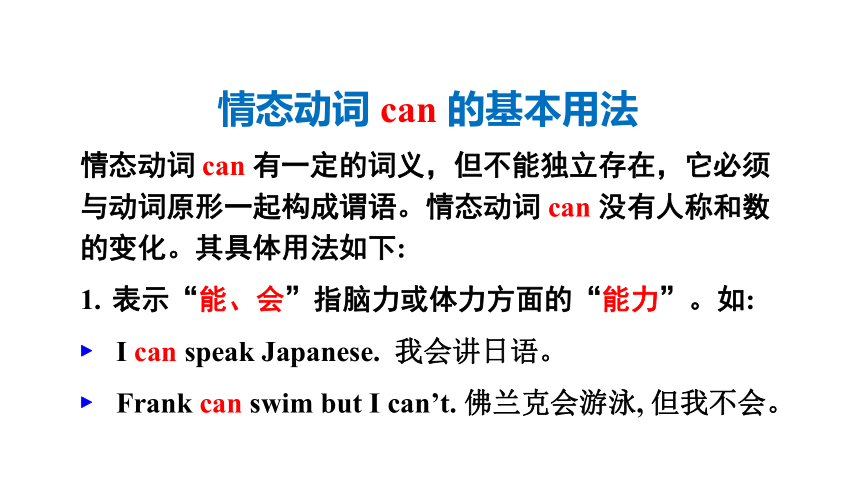
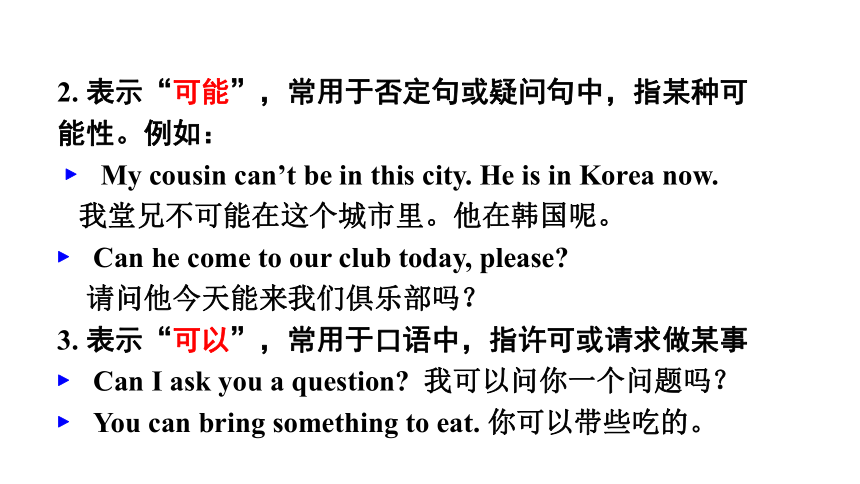
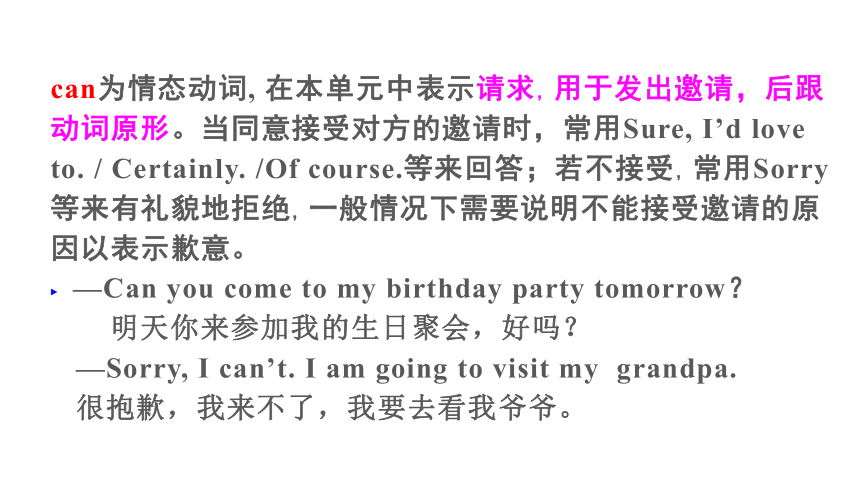
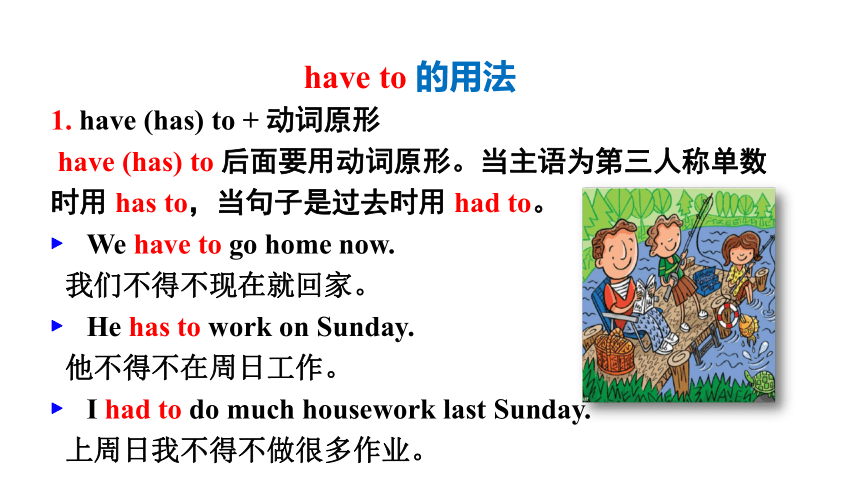
文档简介
(共23张PPT)
Unit 9
Can you come to
my party
Section A
Grammar Focus-3c
Pairwork
A: Can he/she/they come to …
B: No, he/ she/ they can’t.
He/ She/ They (might) have (has) to/ must…
Can you come to my party on Saturday Sure, I’d love to.
Sorry, I must study for a math test.
Can you go to the movies tomorrow night Sure. That sounds great.
I’m afraid not. I have the flu.
Can he go to the party No, he can’t. He has to help his parents.
Can she go to the baseball game No. she’s not available. She must go to the doctor.
Can they go to the movies No, they’re not free. They might have to meet their friends.
Grammar Focus
用can发出邀请
用can打听第三方是否能参加聚会,表示一种可能性。
接受邀请
拒绝邀请
说明理由
How to accept an invitation.
Yes, I’d love/like to.
Certainly, I’d love/like to.
Sure, I’d love/like to.
Thanks for your invitation.
Thanks for asking me.
Summary
How to decline an invitation.
I’m sorry, I can’t. I have to …
I’d love to, but I have to …
Sorry, I can’t. I’m going to ...
Thanks for your invitation.
Thank you for asking me.
情态动词 can 的基本用法
情态动词 can 有一定的词义,但不能独立存在,它必须与动词原形一起构成谓语。情态动词 can 没有人称和数的变化。其具体用法如下:
表示“能、会”指脑力或体力方面的“能力”。如:
I can speak Japanese. 我会讲日语。
Frank can swim but I can’t. 佛兰克会游泳, 但我不会。
2. 表示“可能”,常用于否定句或疑问句中,指某种可能性。例如:
My cousin can’t be in this city. He is in Korea now.
我堂兄不可能在这个城市里。他在韩国呢。
Can he come to our club today, please
请问他今天能来我们俱乐部吗?
3. 表示“可以”,常用于口语中,指许可或请求做某事
Can I ask you a question 我可以问你一个问题吗?
You can bring something to eat. 你可以带些吃的。
can为情态动词, 在本单元中表示请求,用于发出邀请,后跟
动词原形。当同意接受对方的邀请时,常用Sure, I’d love
to. / Certainly. /Of course.等来回答;若不接受,常用Sorry
等来有礼貌地拒绝,一般情况下需要说明不能接受邀请的原
因以表示歉意。
—Can you come to my birthday party tomorrow?
明天你来参加我的生日聚会,好吗?
—Sorry, I can’t. I am going to visit my grandpa.
很抱歉,我来不了,我要去看我爷爷。
have to 的用法
1. have (has) to + 动词原形
have (has) to 后面要用动词原形。当主语为第三人称单数时用 has to,当句子是过去时用 had to。
We have to go home now.
我们不得不现在就回家。
He has to work on Sunday.
他不得不在周日工作。
I had to do much housework last Sunday.
上周日我不得不做很多作业。
2. have to 的否定句句型:
主语 +don’t/didn’t/doesn’t won’t +have to + 动词原形
You don’t have to walk so fast.
你不必走那么快。
He will not have to buy a new coat next year.
明年他没必要买新外衣了。
3. have to 的疑问句句型:
Do/Does/Did/Will + 主语 + have to + 动词原形
Did he have to ask the question
他非要问那个问题吗?
Yes, he did. 是的。
No, he didn’t (have to). 不。
不能独立作谓语,只能和动词原形一起构成谓语,
表示说话人的语气和情态。
2. 没有人称和数的变化。 (have to除外)
3. 否定形式:在其之后加not (have to除外)
疑问形式:情态动词提到主语之前(have to除外)。
3. have to的意思是“必须、不得不”, 往往强调由于客观原因
而必须做某事。 have to 后接动词原形;have to有人称、数和
时态的变化, 其第三人称单数形式为has to, 其疑问形式和否定
形式要借助于助动词do或does来完成。例如:
We have to look after our sister at home.
我们不得不在家照顾我们的妹妹。
Does he have to get up early tomorrow morning
明天早上他必须早起吗?
I don’t have to stay at home today. 今天我不必待在家里。
4. must/have to
must 表示主观“必须”;have to表示客观客观需要,即
“不得不” 。
I don’t like this TV set. I must buy a new one.
This TV set doesn’t work. We have to buy a new one.
You must get up at five tomorrow.
We (will) have to get up early tomorrow.
I had to leave early because I wasn’t feeling well.
She said she must/had to see the manager.
表示邀请的句型: (你能来参加我的聚会吗 )
Can you come to my party
Could you come to my party
Would you like to come to my party
接受邀请:
拒绝邀请:
Sure, I’d love/like to.
I’m sorry, I can’t. I have to…
/I’m V-ing…
小结
3a
Practice
Complete the answers with might and one of the phrases in the box.
watch TV on the weekend my cousin
visit my grandparents practice the violin
1. A: What are you going to do on Saturday
B: I’m not sure. I might _______________________________
2. A: What are you planning to do after school
B: I don’t know. ____________________
visit my grandparents
I might watch TV.
3. A: When will you finish the science homework
B: _____________________________________________
4. A: Who are you going to the movies with
B:______________________________________________
5. A: Are you free to come to my place on Saturday
B: ______________________________________________
I don’t know. I might finish it on the weekend.
I’m not sure. I might be going with my cousin.
I’m not sure. I might have to practice the violin.
3b
Complete the sentences below. Use the words in brackets to help you.
Inviting: _________________________________(can / play tennis)
Accepting: _____________________________________________ 2. Inviting: ______________________________________ (would like to/ go to the movies)
Refusing: ______________________________________________
Reason: __________________________________(might have to)
Can you play tennis on Saturday
Sure. That sounds great.
Would you like to go to the movies on Friday
Sorry, I’m not available.
I might have to go out with my parents.
3. Inviting: ____________________________________
(can/hang out with us tonight)
Refusing: ____________________________________________
Reason: ___________________________________________ (must)
4. Inviting: _____________________________________
( would like to / come to my birthday party)
Accepting: _________________________________
Can you hang out with us tonight
Sorry, I’m not free.
I must study for a test.
Would you like to come to my birthday party
Sure. I’d love to.
3c
Write down everything you have to do next
week. Choose a day and time to have a party.
Then invite classmates to your party.
A: Can you come to my party
B: When is it
A: Next week, on Thursday night.
B: I’m sorry. I have to study for a math test.
Invite classmates to your party.
Let’s see how many classmates you can invite!
If some students can’t come, write down the reasons.
Then give a report!
name
Accept
Refuse& reason
Exercises
一、单项选择。
1. — ______ you come to my house to watch the baseball match on TV
—Sure, I’d love to.
A. May B. Must C. Should D. Can
2. — Today is my birthday. Can you come to my party tonight
— ______, but I should finish my homework first.
A. That’s too bad B. Yes, please
C. No, I don’t know D. I’d love to
D
D
3. —Why didn’t you come to my party
—I _____stay at home,because my mother was ill.
A. has to B. have to C. had D. had to
4. They were afraid that it _____ rain the next day.
A. must B. should C. might D. may
5. She ______ my invitation because she wasn’t available.
A. rewarded B. accepted C. refused D. received
D
C
C
6.Harry invited me ______ with him when his parents were out of town.
Stay B. stayed C. staying D. to stay
7. —Could you come back home for dinner
—______. I’ll be at a very important business meeting at that time.
A. I think so. B. I’m afraid not.
C. Yes, I hope so. D. I’m afraid so.
D
B
Unit 9
Can you come to
my party
Section A
Grammar Focus-3c
Pairwork
A: Can he/she/they come to …
B: No, he/ she/ they can’t.
He/ She/ They (might) have (has) to/ must…
Can you come to my party on Saturday Sure, I’d love to.
Sorry, I must study for a math test.
Can you go to the movies tomorrow night Sure. That sounds great.
I’m afraid not. I have the flu.
Can he go to the party No, he can’t. He has to help his parents.
Can she go to the baseball game No. she’s not available. She must go to the doctor.
Can they go to the movies No, they’re not free. They might have to meet their friends.
Grammar Focus
用can发出邀请
用can打听第三方是否能参加聚会,表示一种可能性。
接受邀请
拒绝邀请
说明理由
How to accept an invitation.
Yes, I’d love/like to.
Certainly, I’d love/like to.
Sure, I’d love/like to.
Thanks for your invitation.
Thanks for asking me.
Summary
How to decline an invitation.
I’m sorry, I can’t. I have to …
I’d love to, but I have to …
Sorry, I can’t. I’m going to ...
Thanks for your invitation.
Thank you for asking me.
情态动词 can 的基本用法
情态动词 can 有一定的词义,但不能独立存在,它必须与动词原形一起构成谓语。情态动词 can 没有人称和数的变化。其具体用法如下:
表示“能、会”指脑力或体力方面的“能力”。如:
I can speak Japanese. 我会讲日语。
Frank can swim but I can’t. 佛兰克会游泳, 但我不会。
2. 表示“可能”,常用于否定句或疑问句中,指某种可能性。例如:
My cousin can’t be in this city. He is in Korea now.
我堂兄不可能在这个城市里。他在韩国呢。
Can he come to our club today, please
请问他今天能来我们俱乐部吗?
3. 表示“可以”,常用于口语中,指许可或请求做某事
Can I ask you a question 我可以问你一个问题吗?
You can bring something to eat. 你可以带些吃的。
can为情态动词, 在本单元中表示请求,用于发出邀请,后跟
动词原形。当同意接受对方的邀请时,常用Sure, I’d love
to. / Certainly. /Of course.等来回答;若不接受,常用Sorry
等来有礼貌地拒绝,一般情况下需要说明不能接受邀请的原
因以表示歉意。
—Can you come to my birthday party tomorrow?
明天你来参加我的生日聚会,好吗?
—Sorry, I can’t. I am going to visit my grandpa.
很抱歉,我来不了,我要去看我爷爷。
have to 的用法
1. have (has) to + 动词原形
have (has) to 后面要用动词原形。当主语为第三人称单数时用 has to,当句子是过去时用 had to。
We have to go home now.
我们不得不现在就回家。
He has to work on Sunday.
他不得不在周日工作。
I had to do much housework last Sunday.
上周日我不得不做很多作业。
2. have to 的否定句句型:
主语 +don’t/didn’t/doesn’t won’t +have to + 动词原形
You don’t have to walk so fast.
你不必走那么快。
He will not have to buy a new coat next year.
明年他没必要买新外衣了。
3. have to 的疑问句句型:
Do/Does/Did/Will + 主语 + have to + 动词原形
Did he have to ask the question
他非要问那个问题吗?
Yes, he did. 是的。
No, he didn’t (have to). 不。
不能独立作谓语,只能和动词原形一起构成谓语,
表示说话人的语气和情态。
2. 没有人称和数的变化。 (have to除外)
3. 否定形式:在其之后加not (have to除外)
疑问形式:情态动词提到主语之前(have to除外)。
3. have to的意思是“必须、不得不”, 往往强调由于客观原因
而必须做某事。 have to 后接动词原形;have to有人称、数和
时态的变化, 其第三人称单数形式为has to, 其疑问形式和否定
形式要借助于助动词do或does来完成。例如:
We have to look after our sister at home.
我们不得不在家照顾我们的妹妹。
Does he have to get up early tomorrow morning
明天早上他必须早起吗?
I don’t have to stay at home today. 今天我不必待在家里。
4. must/have to
must 表示主观“必须”;have to表示客观客观需要,即
“不得不” 。
I don’t like this TV set. I must buy a new one.
This TV set doesn’t work. We have to buy a new one.
You must get up at five tomorrow.
We (will) have to get up early tomorrow.
I had to leave early because I wasn’t feeling well.
She said she must/had to see the manager.
表示邀请的句型: (你能来参加我的聚会吗 )
Can you come to my party
Could you come to my party
Would you like to come to my party
接受邀请:
拒绝邀请:
Sure, I’d love/like to.
I’m sorry, I can’t. I have to…
/I’m V-ing…
小结
3a
Practice
Complete the answers with might and one of the phrases in the box.
watch TV on the weekend my cousin
visit my grandparents practice the violin
1. A: What are you going to do on Saturday
B: I’m not sure. I might _______________________________
2. A: What are you planning to do after school
B: I don’t know. ____________________
visit my grandparents
I might watch TV.
3. A: When will you finish the science homework
B: _____________________________________________
4. A: Who are you going to the movies with
B:______________________________________________
5. A: Are you free to come to my place on Saturday
B: ______________________________________________
I don’t know. I might finish it on the weekend.
I’m not sure. I might be going with my cousin.
I’m not sure. I might have to practice the violin.
3b
Complete the sentences below. Use the words in brackets to help you.
Inviting: _________________________________(can / play tennis)
Accepting: _____________________________________________ 2. Inviting: ______________________________________ (would like to/ go to the movies)
Refusing: ______________________________________________
Reason: __________________________________(might have to)
Can you play tennis on Saturday
Sure. That sounds great.
Would you like to go to the movies on Friday
Sorry, I’m not available.
I might have to go out with my parents.
3. Inviting: ____________________________________
(can/hang out with us tonight)
Refusing: ____________________________________________
Reason: ___________________________________________ (must)
4. Inviting: _____________________________________
( would like to / come to my birthday party)
Accepting: _________________________________
Can you hang out with us tonight
Sorry, I’m not free.
I must study for a test.
Would you like to come to my birthday party
Sure. I’d love to.
3c
Write down everything you have to do next
week. Choose a day and time to have a party.
Then invite classmates to your party.
A: Can you come to my party
B: When is it
A: Next week, on Thursday night.
B: I’m sorry. I have to study for a math test.
Invite classmates to your party.
Let’s see how many classmates you can invite!
If some students can’t come, write down the reasons.
Then give a report!
name
Accept
Refuse& reason
Exercises
一、单项选择。
1. — ______ you come to my house to watch the baseball match on TV
—Sure, I’d love to.
A. May B. Must C. Should D. Can
2. — Today is my birthday. Can you come to my party tonight
— ______, but I should finish my homework first.
A. That’s too bad B. Yes, please
C. No, I don’t know D. I’d love to
D
D
3. —Why didn’t you come to my party
—I _____stay at home,because my mother was ill.
A. has to B. have to C. had D. had to
4. They were afraid that it _____ rain the next day.
A. must B. should C. might D. may
5. She ______ my invitation because she wasn’t available.
A. rewarded B. accepted C. refused D. received
D
C
C
6.Harry invited me ______ with him when his parents were out of town.
Stay B. stayed C. staying D. to stay
7. —Could you come back home for dinner
—______. I’ll be at a very important business meeting at that time.
A. I think so. B. I’m afraid not.
C. Yes, I hope so. D. I’m afraid so.
D
B
同课章节目录
- Unit 1 Where did you go on vacation?
- Section A
- Section B
- Unit 2 How often do you exercise?
- Section A
- Section B
- Unit 3 I'm more outgoing than my sister.
- Section A
- Section B
- Unit 4 What's the best movie theater?
- Section A
- Section B
- Unit 5 Do you want to watch a game show?
- Section A
- Section B
- Unit 6 I'm going to study computer science.
- Section A
- Section B
- Unit 7 Will people have robots?
- Section A
- Section B
- Unit 8 How do you make a banana milk shake?
- Section A
- Section B
- Unit 9 Can you come to my party?
- Section A
- Section B
- Unit 10 If you go to the party, you'll have a grea
- Section A
- Section B
